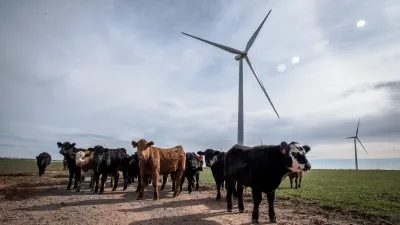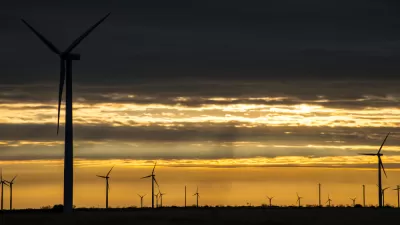The Obama-era American Recovery and Reinvestment Act of 2009 funded clean energy and created jobs during the Great Recession. Will clean energy be considered in a future stimulus bill to mitigate economic strain cased by the coronavirus pandemic?

When Congress passed the American Recovery and Reinvestment Act in 2009, an $800 billion stimulus package signed by President Obama during the Great Recession, $90 billion was budgeted to support clean energy initiatives and infrastructure. The administration sought to put people back to work while assisting long-term positive impacts on climate and public health, says Obama's top energy and climate advisor Carol Browner.
"A decade later, as the country enters a pandemic-driven economic downturn that could rival or exceed the Great Recession, the Recovery Act provides a template for how lawmakers might drive further growth in clean energy — particularly nascent industries such as energy storage or electric vehicles," writes Sammy Roth.
So far, lawmakers have not taken action to support clean energy advances. Clean energy funding was notably absent from the $2.2 trillion stimulus package passed in late March.
If Democrats gain a majority in the Senate and win the presidential election, it's likely that a Recovery Act-inspired stimulus bill would follow. Some predict that the bill would support the electric vehicle supply chain. Browner contends that clean energy investment should support public health by working to reduce carbon dioxide and air pollution produced by gas-powered vehicles. Companies in solar and wind energy are also requesting support to avoid the loss of 35,000 jobs and $35 billion in investment.
FULL STORY: Should we spend billions on clean energy? It worked during the last crisis

Maui's Vacation Rental Debate Turns Ugly
Verbal attacks, misinformation campaigns and fistfights plague a high-stakes debate to convert thousands of vacation rentals into long-term housing.

Planetizen Federal Action Tracker
A weekly monitor of how Trump’s orders and actions are impacting planners and planning in America.

San Francisco Suspends Traffic Calming Amidst Record Deaths
Citing “a challenging fiscal landscape,” the city will cease the program on the heels of 42 traffic deaths, including 24 pedestrians.

Defunct Pittsburgh Power Plant to Become Residential Tower
A decommissioned steam heat plant will be redeveloped into almost 100 affordable housing units.

Trump Prompts Restructuring of Transportation Research Board in “Unprecedented Overreach”
The TRB has eliminated more than half of its committees including those focused on climate, equity, and cities.

Amtrak Rolls Out New Orleans to Alabama “Mardi Gras” Train
The new service will operate morning and evening departures between Mobile and New Orleans.
Urban Design for Planners 1: Software Tools
This six-course series explores essential urban design concepts using open source software and equips planners with the tools they need to participate fully in the urban design process.
Planning for Universal Design
Learn the tools for implementing Universal Design in planning regulations.
Heyer Gruel & Associates PA
JM Goldson LLC
Custer County Colorado
City of Camden Redevelopment Agency
City of Astoria
Transportation Research & Education Center (TREC) at Portland State University
Jefferson Parish Government
Camden Redevelopment Agency
City of Claremont





























